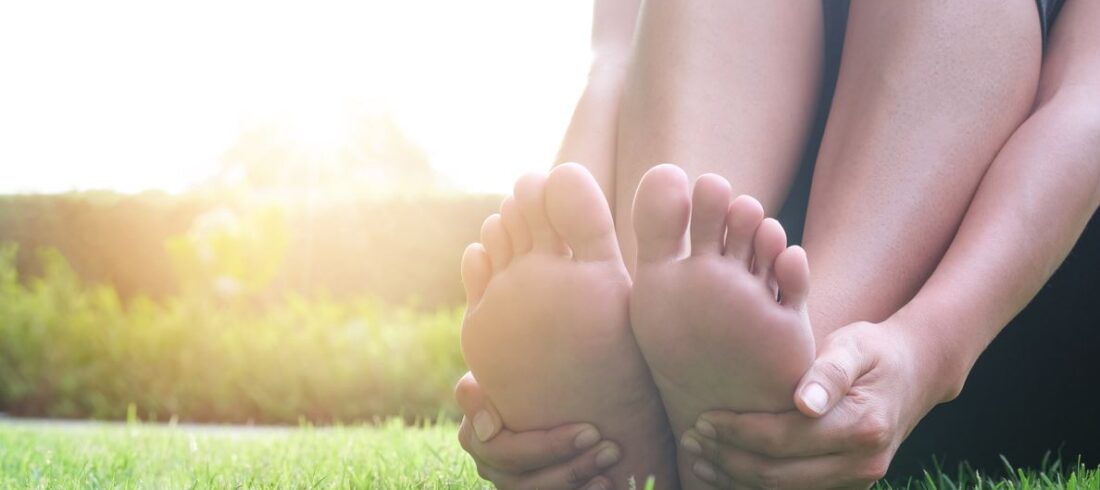As the weather warms up more people spend increased amounts of time outdoors. Walking, running, biking, and many other forms of exercise and recreation can take a toll on your feet. According to a study by the American Podiatric Medical Association, 75% of Americans will experience foot problems at one time or another in their lives. Looking after your feet by wearing appropriate footwear, or finding the root cause of pain and discomfort will help ensure the time you spend on your feet is enjoyable. In this blog post, we will discuss some tips on how to take care of your feet so you can put your best foot forward.
Maintain Good Foot Hygiene
Your feet have the highest concentration of sweat glands when compared to any other part of your body2. Regularly washing your feet with soap and water and thoroughly drying them can prevent fungal infections, odors, and other foot problems. Applying moisturizer to your feet every day can keep them soft and prevent dry, cracked skin. When cutting your toenails, make sure to cut them straight across and avoid cutting them too short, as this can lead to ingrown toenails.
Also use a proper nail clipper instead of scissors or other sharp objects. This is especially important if you have been diagnosed with diabetes, as this chronic disease can cause peripheral artery disease (PAD), also known as poor circulation. Poor circulation can negatively affect the feet, putting patients at a greater risk of developing foot ulcers, slow-healing sores, and infections that are difficult to treat. Additionally, reduced sensation or numbness in the feet can make it difficult to notice foot ailments or injuries early on, making preventative care critical.
Wear Proper Footwear
It is essential to use appropriate footwear to protect your feet, especially when you engage in activities such as running or hiking. Wearing protective shoes, like steel-toed boots, can also prevent injuries in the workplace. Shoes that fit well and provide enough support can prevent blisters, calluses, and other foot problems.
Where possible, avoid wearing tight shoes or high heels for extended periods. This can reduce the risk of developing painful conditions such as corns and bunions. Also be sure to alternate your shoes, giving them time to dry out between wears. This can also help to prevent foot odor and reduce the risk of infections.
Balance High Impact and Low Impact Exercise
High impact exercise can help strengthen the muscles and bones of the feet, which can improve balance and stability. It also increases blood flow to the feet and improves overall cardiovascular health. However, high impact exercise may also put a lot of stress on the feet, particularly the plantar fascia (the band of tissue that runs along the bottom of the foot) and the bones and joints in the feet. This can lead to injuries such as stress fractures, plantar fasciitis, as well as several Achilles tendon disorders.
It’s important to gradually increase the intensity of your workouts to avoid overuse injuries. Low impact exercise, such as walking, is great exercise for your feet and can help improve your overall health3.
Stretch and Rest Your Feet
Stretching your feet can help to improve circulation, reduce muscle tension, and prevent cramps and injuries. Try doing simple exercises, like ankle rotations or toe curls, to stretch and strengthen your feet. Resting your feet is also important for reducing fatigue, improving circulation, preventing injuries, and alleviating foot pain.
When to See a Doctor for Foot Pain
As noted in this blog, taking care of your feet is vital to prevent foot problems and maintain overall foot health. By following the tips mentioned above, you can keep your feet healthy, comfortable, and pain-free. Remember, your feet are your foundation, so take care of them, and they’ll take care of you.
If you have foot problems that persist or worsen, seek professional help. A podiatrist can diagnose and treat foot conditions and provide advice on proper foot care. Contact the Premier Medical Group Podiatry care team today to schedule an appointment at 1-888-632-6099.
1: https://www.health.harvard.edu/staying-healthy/dont-forget-your-feet
2: https://www.ncbi.nlm.nih.gov/books/NBK482278/
3: https://orthopedicassociates.org/facts-about-foot-pain-that-you-probably-didnt-know/

